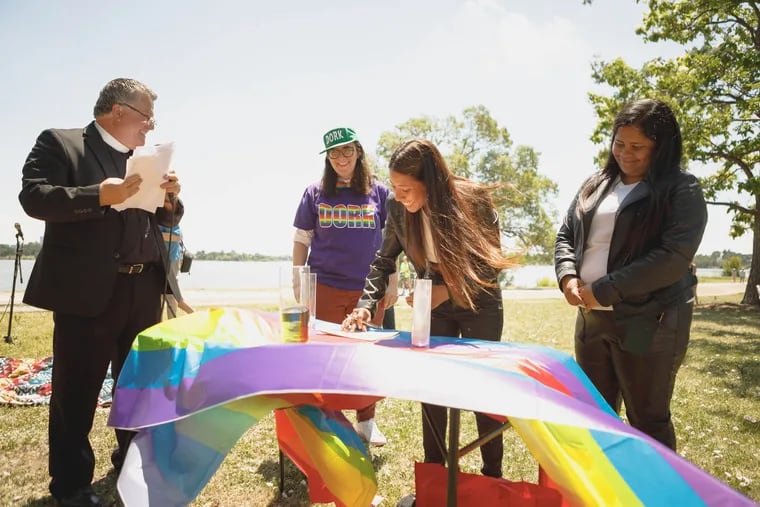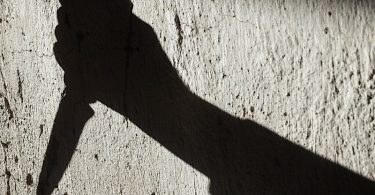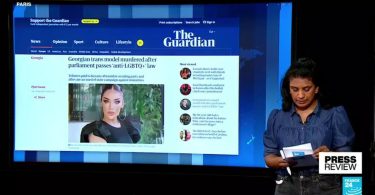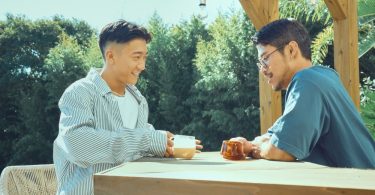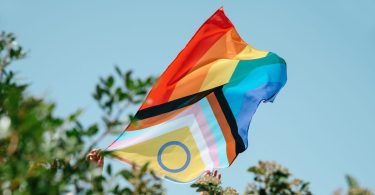DENVER — Amarilis Marte and Mariangy Delgado Gutiérrez didn’t leave their native Venezuela and spend three months traveling about 5,000 miles to the United States because they were pursuing a “dream.” They yearned for something both more practical and more basic.
The practical? “I didn’t come here for an American dream,” Mariangy told me in an interview last week. “I came to this country for calmness, stability — to live peacefully without the fear that someone would kill you.”
It was not an abstract concern. In Venezuela, a nation mostly defined over the last decade by economic and social unrest under the autocratic regime of President Nicolás Maduro, Amarilis, 24, and Mariangy, 31, said they lived with a persistent worry that they would be harmed — not just because of the country’s overall instability, but also because they are a lesbian couple. In Venezuela, as in much of Latin America, there is a widespread intolerance of the LGBTQ community.
“There was a lot of aggression toward us both,” Mariangy said, adding that the couple had received at least one death threat.
Then, there was the basic: The two wanted to be wed. With same-sex marriages banned in their home country, and the price of even the simplest ceremony out of reach in their new home in Colorado, it seemed they had few options.
That’s when Denver’s LGBTQ community rallied around them. A Pennsylvania native organized the wedding, complete with donated photography, a wedding cake, cookies, rainbow flags, and a wedding arch in honor of Pride Month.
“We are waiting for a favor from God,” Mariangy said.
That favor came in the form of their new neighbors in their new home, including Susan Law, the Pennsylvania woman who put together the weekend’s events.
Law, the executive director of Dork Dancing, a nonprofit that encourages people to dance as a way to improve their mental health, met Amarilis and Mariangy through her volunteer work with mutual aid and migrant communities.
In a migrant support group on Facebook, she saw a news clip about the couple and reached out to ask if they were interested in attending the Denver Pride parade with Dork Dancing.
“I wanted to set aside a certain number of spots for the unhoused and migrant LGBTQ community members,” said Law, who grew up in Murrysville, Pa., a 20-minute drive from Pittsburgh. “They told me what they had been through. They were in serious hardship and needed my help.”
When she heard the couple couldn’t afford a $30 marriage license, she vowed to throw them a wedding during Pride Month.
So last Sunday, a crowd of 70 LGBTQ people and allies gathered to celebrate the couple under the shade of a cottonwood tree at Sloan’s Lake Park, about four miles from the home of Molly Brown, the Denver philanthropist who survived the Titanic sinking.
The Rev. Quirino Cornejo officiated. The couple walked down the aisle lined with Pride flags to the sounds of “The Story” by Brandi Carlile. Many guests brought their children. Others contributed lemon crinkle cookies to the Pittsburgh-style cookie table. And unlike at many weddings, most of the attendees were meeting each other for the first time.
Before the ceremony started, I spoke with David Hosanna and Jaime Rodriguez, who met a year ago this month at a gay bar. “For anyone who has negative things to say about Pride, I would say you’re missing the big picture,” Rodriguez said. “Who is to say that someone you’ve come to love — a friend, niece, grandchild, nephew — won’t need this in the future? Wouldn’t you feel better and happier knowing that they are entering a more accepting world?”
At one point during the ceremony, an orange Jeep sped by, the driver shouting expletives about Pride from a lowered window. Minutes later, a minivan passed in the opposite direction, honking exuberantly and waving a rainbow umbrella out of the passenger-side window.
The brides poured black-and-white sand into a shared vessel to symbolize their union. They had wanted to be married for years since they were in Venezuela, but it wasn’t safe to do so. Under Venezuelan law, same-sex couples do not have protections or rights. And while same-sex relationships are not explicitly illegal, as they are in 67 countries, frequently, LGBTQ Venezuelans face violence.
“We feel more free here,” Mariangy said.
A perilous journey
Amarilis and Mariangy’s journey to Sloan’s Lake Park began five years ago when they first started dating. In 2020, fearing for their safety, the couple and their two daughters, ages 9 and 13, left their home in Valencia, Venezuela, and fled to Colombia.
They left Bogotá on July 14 for Medellín, Colombia, and spent almost four months traveling overland to the United States. They crossed the Darién Gap, a 60-mile stretch of dense jungle between Colombia and Panama, over three days without eating; the little food they found in the trash was saved for their children.
In addition to being perilous, crossing Central America is expensive. In Panama, the family was kidnapped and told to pay $280 per head to continue. When the kidnappers realized Amarilis and Mariangy didn’t have money, nor did their friends and family back home, they let them go.
The threats continued: In Mexico, on a packed train, a cartel stopped the railcar and took money from the passengers. Mariangy told me she and Amarilis had to protect the kids from assault. They jumped from the top of the train and ran barefoot over mountains until they reached a faraway town.
After three arduous months, the family of four arrived legally as asylum-seekers at the border in Texas on Oct. 28, where Amarilis was detained by migration. Mariangy and her daughters were given the option of taking a bus to New York, Washington, D.C., or Denver. She chose Denver because she heard that there would be shelters. On Dec. 1, Amarilis rejoined them.
“We are here,” Mariangy told me. “That’s the most important thing.” They survived.
A call to action
When they reached Colorado, Amarilis and Mariagny wanted to marry, but they couldn’t afford the simplest items for a ceremony. The family lives in the 16th most expensive metro area in the country, where they spend $800 a month to sleep on the floor of an apartment with five people they don’t know, all men. The family sleeps in a closet.
Their dreams are so prosaic as to be beautiful. They want a house for their kids to thrive in, good work to support their family, and to have another child together. They want to get a dog, though they differ in preferences: Mariangy wants a mini schnauzer. Amarilis would prefer a German shepherd.
The wedding on the shore of Sloan’s Lake was a celebration, but also a call to action. Without Law’s help, they would likely be on the streets. The family is still food insecure. Paying rent is a struggle; Law helped them with a missing $450 a few days before the wedding. Once they get work permits, her hope is to help Amarilis and Mariangy identify a source of income beyond cleaning patios or backyards.
“Community support can’t stop after one day,” Law wrote in an Instagram story. She started a GoFundMe page for the couple to help cover their food, housing, and other expenses, and a wedding registry to cover other essentials.
In my life, I have ridden a bicycle in Toronto behind the Dykes on Bikes and learned the hard way not to wear glitter on my eyes in the rain. I’ve marched at Pride in New Hampshire, New Zealand, and watched from the sidelines in New York City.
None of that was as meaningful as watching Mariangy and Amarilis get married. It was a privilege to witness the true power of the LGBTQ community. Celebrating Pride means uplifting the most vulnerable among us.

